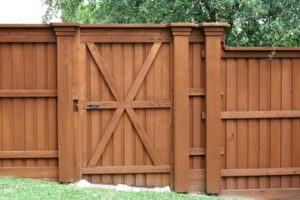Spending time in the backyard with friends and family is great, but sometimes you need a bit of privacy. A fence that blocks your yard from prying eyes is a great way to keep things private.
A privacy fence can be made from a  variety of materials including treated wood, vinyl, and masonry. Each style has its own set of benefits.
variety of materials including treated wood, vinyl, and masonry. Each style has its own set of benefits.
Privacy is an important component of personal freedom. It allows us to live our lives free from the prying eyes of others while still permitting those around us to have a positive relationship with one another. A lack of privacy can lead to insecurities, anxiety, and loss of self-esteem and self-respect.
Privacy fences can help protect our families and friends from strangers, burglars, and other unwanted intruders. They can also keep valuable items and yard equipment out of sight and out of mind. Additionally, fences can block the view of backyard activities from neighbors and other passersby.
While privacy fences are typically constructed out of wood or vinyl, they can also be made from other materials such as brick and concrete. The type of material chosen will affect the fence’s privacy level. Brick fences offer solid privacy, while vinyl and wooden fences have slats with gaps that can allow people to see through the fence if they are close enough.
The type of fence chosen will also affect the cost. Fencing is priced based on the number of linear feet needed, so bigger yards will cost more than smaller ones. A fence can also be expensive if it requires more labor to install. For example, a backyard that is full of rocks, tree roots, and other debris will require the posts to be dug deeper into the ground. This is time-consuming and often expensive.
A slatted chain link privacy fence blends metal’s strength and durability with the slatted design’s airiness. This is a good option for homeowners who want the security of a fence but don’t want to compromise on visual appeal.
Security
Security is a key reason for many homeowners to invest in fencing. They don’t want nosy neighbors or passersby to be able to see into their backyard and observe their family relaxing, playing games or enjoying the view. Fences are the perfect solution because they can be tall enough to keep prying eyes out while still allowing in light and air.
The materials used to construct privacy fences are also important to consider. Steel privacy fences, for example, are a strong and durable choice that can stand up to the elements and last a long time with minimal maintenance. This type of fencing can be combined with wood for a more traditional look or with latticework for added visual appeal.
Another option is a wooden fence constructed of cedar. This natural material is durable and looks great on most landscapes. Cedar fences can be stained or painted to match the style of your yard. If you’re looking for a modern fence, consider using a western red cedar privacy fence or treated pine.
Whether you choose to go with a wood or vinyl privacy fence, it’s best to consult your HOA or other local rules before installing the fencing. These may include regulations on fence height, style, and more. Some areas also require permits for fencing projects, especially those taller than six feet.
A final consideration when choosing a privacy fence is the cost. Fencing materials are priced based on how much they’re needed per linear foot, which can significantly impact the project’s overall cost. This is particularly true for large yards that require a lot of materials or if the area is irregularly shaped.
Having a private space for outdoor activities can make the difference between a house that feels like a home and one that feels empty and detached. Privacy fences are a smart way to bring some privacy to your property and make it feel more comfortable. You can keep your kids and pets safe, enjoy a meal outdoors or relax in the hot tub without having to worry about prying eyes.
Aesthetics
Although privacy fences are primarily designed to keep people out, they can also provide an attractive aesthetic. They come in a variety of styles, colors, and materials so you can find one that matches your home. They can also block out noise from passing traffic or neighboring homes, making your yard a peaceful oasis where you can relax and enjoy the company of your friends and family.
Aesthetics is a philosophy that deals with the nature and value of art and natural objects. It is closely related to the philosophy of art, but it is broader in scope and deals with those responses to objects that find expression in terms such as beauty and ugly. It is also concerned with the way in which these reactions are mediated by a variety of factors, including culture, emotions, intellectual opinions, values, subconscious behaviour, and sociological institutions.
If you love the look of stone walls but don’t want to pay for the high cost of real stone, consider using simulated stone in your privacy fence. This material looks just like a real rock wall, but is leaps and bounds easier to clean and maintain. In fact, CertainTeed’s Allegheny simulated stone fencing is considered the gold standard in the industry.
Another great option for those who want a more rustic, natural look is to build a masonry fence. This style of fence can be very tall, making it difficult for passersby to see into your yard. Masonry fences can be built with a range of materials, from traditional wood to high-quality brick.
Other materials that can be used for privacy fences include concrete and steel. These are strong, durable, and have the added benefit of providing an element of security to your property. Concrete and steel privacy fences can also be a good choice for those who want to protect their children or pets from intruders.
Some privacy fences are more effective at hiding the contents of a yard than others. For example, bamboo fences have a solid infill and are highly private, while vinyl or aluminum fences may have some gaps between slats. If you’re planning on building a privacy fence, it’s important to review any homeowner’s association (HOA) rules that may impact your choice of height and style.
Noise
A privacy fence can help homeowners create a quiet retreat that blocks noise from neighbors and nearby traffic. If a home backs up to a busy street or alley, the sound of trucks and people passing by can be disturbing. A six or eight-foot privacy fence can block out these sounds and provide a peaceful area for relaxation and entertainment.
A fence can be constructed from wood, iron, vinyl, or other materials, each offering its own set of benefits and costs. Depending on the material chosen, a privacy fence can also be shaped or embellished to add style and character. A steel fence, for example, offers a sturdy barrier and a modern aesthetic that is durable and easy to maintain. However, it can be more expensive than other fencing options.
For budget-conscious shoppers, a wooden fence can add a natural element to the yard and be a cost-effective way to achieve privacy. Treated wood is inexpensive and requires little maintenance. Other affordable options include vinyl and chain link fencing, both of which offer the look of a traditional fence at a lower price. For homeowners with a more luxurious taste, a simulated stone fence offers the high-end look of a granite wall for a fraction of the cost. CertainTeed’s Allegheny simulated stone fence is one such option, which looks like real stone but is easier to clean and maintain than a granite wall.
To determine how much a privacy fence will cost, homeowners should measure the length of their yard and calculate how many linear feet of fencing they need. They should then choose a height and design that complements their landscape and home. Finally, they should check with their homeowner’s association, as some communities have restrictions regarding fence size, height, and material.
In addition to the cost of the fence itself, homeowners should keep in mind that they will likely need a gate and other accessories, such as post caps and latticework. Gates typically run $275 apiece, while posts average $4 to $90 apiece and may require concrete bases. The type of fence selected will also affect the total cost, with picket or iron fences costing less than vinyl and wood panel fences.
